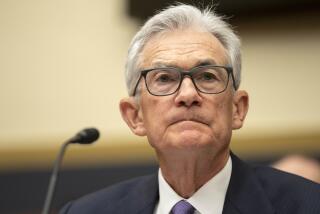Federal Action to Avoid Slump Held Unneeded
- Share via
WASHINGTON — President Bush’s chief economic adviser said Tuesday that the Administration does not believe that it needs to make any immediate policy moves to avoid a recession, although he acknowledged that the economy is now in the midst of a worsening slowdown.
Separately, the Federal Reserve Board on Tuesday confirmed reports that it will reduce some reserve requirements for commercial banks. The move, the first such action in seven years, is intended to free up more money for the weakened banking system while easing a credit shortage that appears to be worsening the economic slowdown.
The Fed’s acted as Michael J. Boskin, chairman of the President’s Council of Economic Advisers, said publicly for the first time that he believes that there will be a decline in the gross national product, the nation’s total output of goods and services, in the fourth quarter of 1990. The decline would be the first since the second quarter of 1986.
But Boskin, like other top Bush Administration officials, studiously avoided declaring that a recession is under way. A recession is technically defined as two consecutive quarters in which the GNP declines.
“The fourth quarter is probably going to be negative, but it is too early to tell if the duration of the slowdown will be long enough to turn into a recession,” Boskin told reporters after appearing at a seminar featuring past and present presidential economic advisers. The seminar was sponsored by the American Enterprise Institute, a conservative Washington think tank.
Boskin insisted that the White House believes that the current direction of economic and fiscal policy is the right one. “And I think that the various departments in the Administration are working on the appropriate policies” to help develop longer-term economic stability, Boskin said.
He said the Administration is working on an updated economic forecast but did not say how soon it would be completed or whether he thought that the forecast’s findings might prompt a change in policy.
Still, Boskin’s comments on the state of the economy represented one of the gloomiest assessments yet to come from the White House since the slowdown began. Although President Bush and his aides have acknowledged publicly in the past that the economy is suffering a slowdown, they have refused to accept the growing consensus among private economists that a recession began sometime in the last few months. But Boskin’s prediction that the GNP will decline for the fourth quarter goes further than previous Administration statements toward accepting the likelihood of a recession.
Administration officials acknowledge that an internal debate is under way over just how long the White House can appear to stand alone in the face of the conventional wisdom on the economy, but that argument has apparently not yet been resolved.
Some Administration officials said the White House may simply avoid labeling current conditions a recession until the economic profession’s official arbiter of business cycles, the National Bureau of Economic Research, declares that a recession has taken place. But Martin S. Feldstein, executive director of the bureau and a presidential economic adviser under Ronald Reagan, said Tuesday that his group may not be ready to declare a recession until next summer.
As for the Federal Reserve action to ease reserve requirements, the nation’s central bank said it “took action at this time in response to mounting evidence that commercial banks have been tightening their standards of credit-worthiness and the terms and conditions for many types of loans. While much of this tightening has been welcome from a safety and soundness standpoint, it has in recent months begun to exert a contractionary influence on the economy.”
The Fed said it will eliminate a requirement that banks maintain a 3% reserve against their jumbo certificates of deposit of $100,000 or more, as well as other large private and business accounts. The central bank will not reduce the more critical requirement that banks maintain reserves of 12% against checking accounts and other common savings accounts.
The action, the first change in reserve requirements in seven years, will allow banks to free as much as $14 billion for lending, which should help banks increase their profitability, analysts say.
The Fed’s action follows a meeting on the credit shortage earlier this month between Fed Chairman Alan Greenspan and Bush and his economic policy-makers. Reportedly, some Administration officials, including Commerce Secretary Robert A. Mosbacher and White House Chief of Staff John H. Sununu, pressed for the Fed to take quick action to make credit more widely available.
More to Read
Get the L.A. Times Politics newsletter
Deeply reported insights into legislation, politics and policy from Sacramento, Washington and beyond. In your inbox three times per week.
You may occasionally receive promotional content from the Los Angeles Times.










